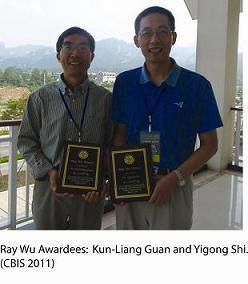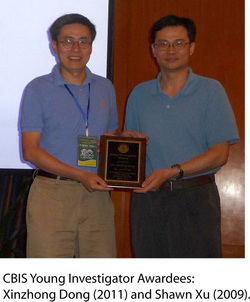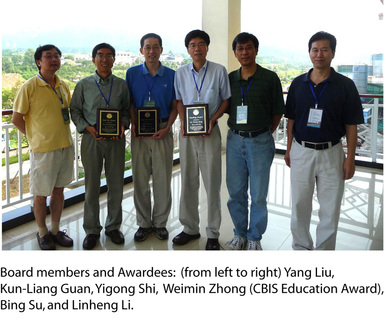CBIS AWARDS 2011
At each biennial society meeting, CBIS awards individuals who have made outstanding contributions to the field of biological sciences in general and to educational reforms in China. Nominations were solicited from CBIS members. The awardees were initially selected by the Nomination Committee, and finally approved by the board of directors. In this year's meeting held in August of 2011 at Zhangjiajie, China, three categories of CBIS awards were given.
The Ray Wu Award
This award was named after Prof. Ray Wu to commemorate his dedication to Chinese Biologists. This year's award was given to Kun-Liang Guan from University of California, San Diego (UCSD) and Yigong Shi from Tsinghua University.
Kun-Liang Guan obtained his Ph.D. degree in 1989 from Purdue University with Prof. Henry Weiner and continued his post-doc training at Purdue University with Prof. Jack Dixon. He started his own laboratory at University of Michigan in 1992 and arose to full professorship in 2000. He moved to UCSD in 2007. Since then, he has also been serving as adjunct or visiting professors at University of Michigan, Fudan University and Zhejiang University.
Kun-Liang's major contributions to biological sciences are the following:
1. Kun-Liang has been a driving force in establishing the basic principles of the MAP kinase pathway. He was among the first to clone human MEK1 and MEK2 and demonstrated that they are direct targets of c-RAF. Kun-Liang has established the basic mechanism of b-RAF activation, which explained the activation mutation of this gene in cancers, including 90% of melanomas.
2. Kun-Liang has established the biochemical mechanism by which TSC1 and TSC2 regulate mTOR activity. He showed that functional loss of TSCs in tuberous sclerosis complex patients could be restored by treatment with mTOR inhibitors. This concept has now demonstrated very significant clinical efficacy for patients with tuberous sclerosis.
3. Kun-Liang, together with Prof. Yue Xiong at University of North Carolina, recently pioneered a new field of metabolic regulation through protein acetylation. With their collaborators from Fudan University, he established how metabolic switches can be induced through genetic alterations in cancer cells.
Kun-Liang is also a great educator, a CBIS advocate, a high standard peer-review contributor to Chinese Natural Science Foundation, and an active organizer for many scientific symposia. He has dedicated tremendous amounts of effort to biological sciences in China, represented by his work at Fudan and Zhejiang Universities. For his numerous contributions, Kun-Liang has received several prestigious awards, including the MacArthur award by the John D. Catherine T. MacArthur Foundation and the Schering-Plough Award (Young Investigator Award) of the American Society of Biochemistry and Molecular Biology. He was elected as fellow of the American Association for the Advancement of Science in 2011.
Yigong Shi obtained his Ph.D. from Johns Hopkins University working with Prof. Jeremy Berg and performed postdoctoral research at Memorial Sloan Kettering Cancer Center in the laboratory of Prof. Nikola Pavletich. After establishing his own laboratory at Princeton University in 1998, Yigong went through the academic rank from an assistant professorship to an endowed professorship in 10 years. In 2008, in order to realize his passion in raising the level of research in biological sciences in China, Yigong took a position in Tsinghua University as an endowed professor and Dean of the School of Life Sciences.
With a wide interest in biological sciences, Yigong's focus is on structural biology. His contributions to biological sciences are listed, but not limited, in the following:
1. His laboratory took the approach of structural biology to elucidate the molecular basis of many important molecules in the apoptotic pathway including caspases, IAPs, Smac, Apaf-1, as well as their Drosophila and C. elegans orthologs. These studies culminated in the recent structural elucidation of the apoptosome, a molecular machinery for caspase activation.
2. His laboratory also studied the Protein Phosphatase 2A holoenzyme, in which he revealed the complicated regulatory mechanisms of this heterotrimeric enzyme.
3. His studies on membrane proteins, with major results in a rhomboid intramembrane protease, a site-2 intramembrane protease, an amino acid antiporter, a formate transporter and the bacterial ECF transporter.
The Ray Wu Award
This award was named after Prof. Ray Wu to commemorate his dedication to Chinese Biologists. This year's award was given to Kun-Liang Guan from University of California, San Diego (UCSD) and Yigong Shi from Tsinghua University.
Kun-Liang Guan obtained his Ph.D. degree in 1989 from Purdue University with Prof. Henry Weiner and continued his post-doc training at Purdue University with Prof. Jack Dixon. He started his own laboratory at University of Michigan in 1992 and arose to full professorship in 2000. He moved to UCSD in 2007. Since then, he has also been serving as adjunct or visiting professors at University of Michigan, Fudan University and Zhejiang University.
Kun-Liang's major contributions to biological sciences are the following:
1. Kun-Liang has been a driving force in establishing the basic principles of the MAP kinase pathway. He was among the first to clone human MEK1 and MEK2 and demonstrated that they are direct targets of c-RAF. Kun-Liang has established the basic mechanism of b-RAF activation, which explained the activation mutation of this gene in cancers, including 90% of melanomas.
2. Kun-Liang has established the biochemical mechanism by which TSC1 and TSC2 regulate mTOR activity. He showed that functional loss of TSCs in tuberous sclerosis complex patients could be restored by treatment with mTOR inhibitors. This concept has now demonstrated very significant clinical efficacy for patients with tuberous sclerosis.
3. Kun-Liang, together with Prof. Yue Xiong at University of North Carolina, recently pioneered a new field of metabolic regulation through protein acetylation. With their collaborators from Fudan University, he established how metabolic switches can be induced through genetic alterations in cancer cells.
Kun-Liang is also a great educator, a CBIS advocate, a high standard peer-review contributor to Chinese Natural Science Foundation, and an active organizer for many scientific symposia. He has dedicated tremendous amounts of effort to biological sciences in China, represented by his work at Fudan and Zhejiang Universities. For his numerous contributions, Kun-Liang has received several prestigious awards, including the MacArthur award by the John D. Catherine T. MacArthur Foundation and the Schering-Plough Award (Young Investigator Award) of the American Society of Biochemistry and Molecular Biology. He was elected as fellow of the American Association for the Advancement of Science in 2011.
Yigong Shi obtained his Ph.D. from Johns Hopkins University working with Prof. Jeremy Berg and performed postdoctoral research at Memorial Sloan Kettering Cancer Center in the laboratory of Prof. Nikola Pavletich. After establishing his own laboratory at Princeton University in 1998, Yigong went through the academic rank from an assistant professorship to an endowed professorship in 10 years. In 2008, in order to realize his passion in raising the level of research in biological sciences in China, Yigong took a position in Tsinghua University as an endowed professor and Dean of the School of Life Sciences.
With a wide interest in biological sciences, Yigong's focus is on structural biology. His contributions to biological sciences are listed, but not limited, in the following:
1. His laboratory took the approach of structural biology to elucidate the molecular basis of many important molecules in the apoptotic pathway including caspases, IAPs, Smac, Apaf-1, as well as their Drosophila and C. elegans orthologs. These studies culminated in the recent structural elucidation of the apoptosome, a molecular machinery for caspase activation.
2. His laboratory also studied the Protein Phosphatase 2A holoenzyme, in which he revealed the complicated regulatory mechanisms of this heterotrimeric enzyme.
3. His studies on membrane proteins, with major results in a rhomboid intramembrane protease, a site-2 intramembrane protease, an amino acid antiporter, a formate transporter and the bacterial ECF transporter.
|
3. Kun-Liang, together with Prof. Yue Xiong at University of North Carolina, recently pioneered a new field of metabolic regulation through protein acetylation. With their collaborators from Fudan University, he established how metabolic switches can be induced through genetic alterations in cancer cells.
Kun-Liang is also a great educator, a CBIS advocate, a high standard peer-review contributor to Chinese Natural Science Foundation, and an active organizer for many scientific symposia. He has dedicated tremendous amounts of effort to biological sciences in China, represented by his work at Fudan and Zhejiang Universities. For his numerous contributions, Kun-Liang has received several prestigious awards, including the MacArthur award by the John D. Catherine T. MacArthur Foundation and the Schering-Plough Award (Young Investigator Award) of the American Society of Biochemistry and Molecular Biology. He was elected as fellow of the American Association for the Advancement of Science in 2011. |
Yigong Shi obtained his Ph.D. from Johns Hopkins University working with Prof. Jeremy Berg and performed postdoctoral research at Memorial Sloan Kettering Cancer Center in the laboratory of Prof. Nikola Pavletich. After establishing his own laboratory at Princeton University in 1998, Yigong went through the academic rank from an assistant professorship to an endowed professorship in 10 years. In 2008, in order to realize his passion in raising the level of research in biological sciences in China, Yigong took a position in Tsinghua University as an endowed professor and Dean of the School of Life Sciences.
With a wide interest in biological sciences, Yigong's focus is on structural biology. His contributions to biological sciences are listed, but not limited, in the following:
1. His laboratory took the approach of structural biology to elucidate the molecular basis of many important molecules in the apoptotic pathway including caspases, IAPs, Smac, Apaf-1, as well as their Drosophila and C. elegans orthologs. These studies culminated in the recent structural elucidation of the apoptosome, a molecular machinery for caspase activation.
2. His laboratory also studied the Protein Phosphatase 2A holoenzyme, in which he revealed the complicated regulatory mechanisms of this heterotrimeric enzyme.
3. His studies on membrane proteins, with major results in a rhomboid intramembrane protease, a site-2 intramembrane protease, an amino acid antiporter, a formate transporter and the bacterial ECF transporter.
With a wide interest in biological sciences, Yigong's focus is on structural biology. His contributions to biological sciences are listed, but not limited, in the following:
1. His laboratory took the approach of structural biology to elucidate the molecular basis of many important molecules in the apoptotic pathway including caspases, IAPs, Smac, Apaf-1, as well as their Drosophila and C. elegans orthologs. These studies culminated in the recent structural elucidation of the apoptosome, a molecular machinery for caspase activation.
2. His laboratory also studied the Protein Phosphatase 2A holoenzyme, in which he revealed the complicated regulatory mechanisms of this heterotrimeric enzyme.
3. His studies on membrane proteins, with major results in a rhomboid intramembrane protease, a site-2 intramembrane protease, an amino acid antiporter, a formate transporter and the bacterial ECF transporter.
Xinzhong Dong obtained his Ph.D. from UCLA and carried out his postdoctoral study at California Institute of Technology with Prof. David Anderson. Xinzhong has been a Howard Hughes Medical Institute Early Career Scientist since 2009. Xinzhong is a rising star in neuroscience particularly in the area of "pain and itches". His major contribution began during his postdoctoral studies when he helped us to understand pain by identification of a large family of approximately 50 GPCRs related to Mas1, called mrgs, a subset of which are expressed in specific subpopulations of sensory neurons that detect painful stimuli. Later genetic studies in his own laboratory demonstrated that this family of receptors is involved in negative regulation of pain sensation but positive regulation of itch sensation. His group also identified a critical partner for the main pain receptor TRPV1, which they called Pirt. Xinzhong's work has been well cited in scientific publications and awarded with many honors.
The CBIS Teaching Award
This is a new category of award established this year to honor scientists who have demonstrated extensive passion and gift in teaching biological sciences to Chinese students both in the USA and in China. Weimin Zhong from Yale University received the award this year.
The CBIS Teaching Award
This is a new category of award established this year to honor scientists who have demonstrated extensive passion and gift in teaching biological sciences to Chinese students both in the USA and in China. Weimin Zhong from Yale University received the award this year.
|
Weimin Zhong has dedicated enormous energy to the development of courses and the teaching activities for Chinese students. Since 2009, Weimin has been involved in designing a new undergraduate curriculum in biology at Zhiyuan College, which offers special programs in an effort to train future scientific leaders, at Shanghai Jiao Tong University. From 2003 to 2010, he lectured in Bio2000 (and was in charge from 2005 to 2009), a course jointly run by the Shanghai Institutes for Biological Sciences, Peking University and Tsinghua University for first-year graduate students in life sciences. From 2003 to 2011, Weimin lectured in BISC 524, a graduate course at Hong Kong University of Science and Technology on molecular and developmental neurobiology. He also taught two undergraduate courses at Peking University for a semester in 2008 as part of a joint program between Yale and Peking University. Weimin has lectured to undergraduate and graduate students in additional institutions in China including Kunming Institute of Zoology, the Graduate School of Chinese Academy of Sciences, Southeastern University, Peking Union Medical College, Fudan University, and Zhejiang University. It is clear that Weimin has been one of the most dedicated members of the CBIS in promoting excellence of teaching in China. |


